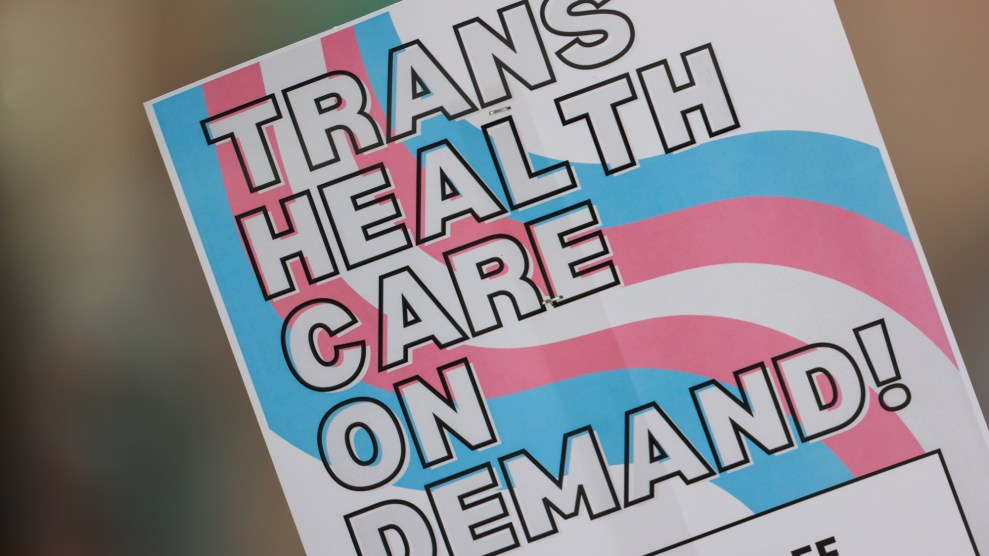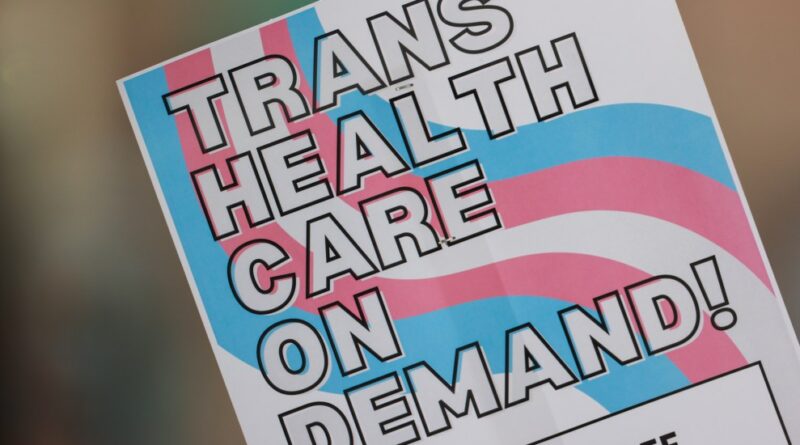A lawsuit over gender dysphoria could invalidate new disability laws

A sign at a transgender rights rally in Houston in June 2023. Reginald Mathalone/NurPhoto/Zuma
When the US Department of Health and Human Services finalized legislation in May that recognizes gender dysphoria I can considered a disability under federal anti-discrimination laws, set the record straight for nearly a decade. The new law sets a warning: Discrimination against transgender people in the workplace, education, health care, childcare, housing and other areas may exist. it violates federal disability protections, and the Biden administration was determined to fight it.
Now, in a lawsuit led by Texas Attorney General Ken Paxton, 17 states are asking the federal court to overturn the law in its entirety, including many provisions that are not related to trans people. This is not a collection of countries; 15 of them have passed restrictions on gender equality, and all have adopted more anti-trans policies.
Among the states’ objections to the new federal law: They will have to “spend time, money and resources” to accommodate employees with gender dysphoria, including using pronouns that match their identity, to Remove sex-related dress codes, and allow. employees use gender-specific bathrooms or locker rooms. Nebraska’s attorney general is concerned that her state’s restrictions on gender-based care are putting it at risk of disability rights complaints and federal investigations. South Dakota opposes this law,” he added[ing] a new group of people with disabilities” whose equal care must be covered by Medicaid.
But gender dysphoria is only part of the 130-page federal law. It also protects the rights of parents with disabilities in child welfare matters and prevents hospitals from using disability as a reason to determine who receives care in crisis situations, such as resource shortages during a pandemic. It adds Long Covid to the list of conditions that can cause disability and strengthens the protection against unnecessary organization, which requires care to be provided in a very limited way and, ideally, in the patient’s community.
“Basically, it’s an attack on the federal government system, and this will affect almost every interaction that a person with a disability has with services and supports. which he finds.”
Overturning this entire law would have far-reaching consequences for all Americans with disabilities and other disadvantaged groups who have relied on federal agencies’ interpretations of decades-old laws to guarantee their rights, says Mia Ives- Rublee, executive director of the Center for American Progress. The Disability Justice Initiative. “They’re using LGBTQ issues as a distraction,” says Ives-Rublee. “Basically, it’s an attack on the federal government system, and this will affect almost every interaction that a person with a disability has with services and supports. which he finds.”
The new law builds on two federal laws passed decades ago to protect people with disabilities in many cities. The Rehabilitation Act of 1973 prohibits discrimination on the basis of disability by the federal government, federal contractors, and – in its Section 504 – by any agencies or employers that receive federal funds. The Americans with Disabilities Act (ADA), signed into law in 1990, extended disability protections to many areas of public life, including education, access to businesses open to the public, and public transportation. . Both laws define a disability as a “physical or mental impairment” that “significantly impairs” one or more major life activities.
When the Rehabilitation Act and the ADA were passed, gender dysphoria was not a recognized medical condition, and both statutes excluded “transvestism, transsexualism,” and “gender identity problems not caused by physical disability” from the definition of disability. But over the decades, medical professionals and courts have come to understand that for many people who identify as the gender they were assigned at birth, there can be serious psychological and other consequences. major negatives in their work and public life. In 2013, gender dysphoria was added to the Diagnostic and Statistical Manual of Mental Disorders.
Since then, individual lawsuits — the primary means by which the ADA is enforced — have created a body of legal decisions that recognize gender dysphoria as a protected health condition and exclusion from t disability protection as discrimination, says Ben Klein, senior director of HIV cases. law at GLBTQ Legal Advocates and Defenders. The exclusion of gender dysphoria “was based on a clear bias toward a disadvantaged group. That’s a concept that judges looking at applications can easily understand—the bias is very clear,” Klein says.
The 4th Circuit Court of Appeals broke ground in 2022 when it became the first federal appeals court to rule on whether gender dysphoria can be considered a disability under disability protection laws of the government. The court decided that the basis of the diagnosis of gender dysphoria – whether it causes a negative impact on daily life – differs from the ADA’s definition of gender identity disorder. (The U.S. Supreme Court declined to hear the case in June 2023, allowing the decision to stand.) Lower state courts have found, like the 4th Circuit, that gender dysphoria is separate from the disorder. gender identity. Some have found that even if gender dysphoria is a gender identity problem, it is caused by a physical disability: a mismatch between a person’s body and gender identity that can be corrected through gender maintenance.
In finalizing its new rule—the first administrative update to Section 504 in half a century—the Department of Health and Human Services touted this body of legislation, which it said has “changed legal status of disability discrimination protection.” But none of that mattered to the states that joined the Texas case, which was released with little media attention in late September.
The lawsuit takes the original language out of the ADA, saying that what doctors now consider gender dysphoria to fall under the legal concept of gender identity disorder. “The Biden administration is once again abusing executive power to ignore federal law and impose unscientific, baseless ideas on the people,” Paxton said in a news release announcing the lawsuit. “Texas Sues Because HHS Doesn’t Have Authority to Write Legal Definitions Individually and Classify ‘Gender Dysphoria’ as a Disability.”
In addition to the issue of gender dysphoria, the case also makes broader allegations about “new regulatory burdens” and “significant costs” associated with the law’s implications for Medicaid programs. Alaska, Montana, and Nebraska, for example, argue that it will be difficult to implement the law’s “least restrictive” requirement because of the shortage of health workers and the unique locations of their states. .
“One of the goals of the ADA is to address discrimination and stereotypes, especially regarding stigmatized health conditions. Gender dysphoria is a highly stigmatized health condition.”
Klein and Ives-Rublee emphasized that the Rehabilitation Act and the ADA were written vaguely with the intention that, over the years, professionals working for government agencies would reexamine and update the regulations that implement the laws, as the scientific and social understanding of disability is changing. When the ADA was passed, trans identity was pathologized, Klein says. “One of the goals of the ADA is to deal with discrimination and myths and stereotypes, especially about stigmatized living conditions,” he tells me. “Gender dysphoria is a stigmatized health condition.”
The new Texas case is one of many ways GOP leaders are using to reinforce their anti-trans beliefs. As I’ve reported, Republican attorneys general—many from the same states as Paxton’s case—are also threatening major medical institutions with criminal investigations for promoting trans youth access to care. gender
Ives-Rublee warns that the Texas suit is also part of a series of attacks on the power of federal agencies to interpret civil rights laws, including protections for pregnant workers and access to health care. having children. This broad effort to dismantle the executive state was bolstered by a series of Supreme Court decisions last year, including one that ended the courts’ expected deference to the federal agency’s interpretations of unclear rules.
Because the gender dysphoria case was filed in the district court in Lubbock, Texas, any appeal will go to the Fifth Circuit Court of Appeals, home to some of the most controversial decisions in recent history. this is legal. If the Fifth Circuit sides with the states in this case, it could conflict with a 4th circuit decision that could force the Supreme Court, and its majority on the right, to weigh in. intentions,” Ives-Rublee says.
#lawsuit #gender #dysphoria #invalidate #disability #laws
